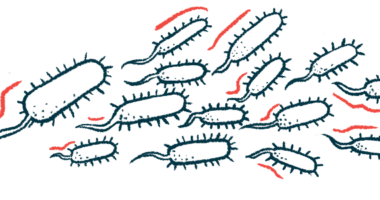Small Study Shows Tobramycin Safely Treats Lung Infection in Infants With CF

Inhaled antibiotic tobramycin safely eradicated early Pseudomonas aeruginosa infection in cystic fibrosis (CF) patients younger than a year old, according to findings from a small retrospective study.
The study, “Evaluation of Inhaled Tobramycin in Early Eradication of Pseudomonas aeruginosa in Infants With Cystic Fibrosis,” was published in The Journal of Pediatric Pharmacology and Therapeutics.
In patients with CF, Pseudomonas aeruginosa lung infection early in life can dramatically affect long-term lung health, quality of life, and survival. A study of newly diagnosed CF patients born before 1994 found that about 29% had developed an initial P. aeruginosa infection by the time they were 6 months old and 65% by the age of 1.
Routine care of CF patients currently includes early detection and antibiotic treatment of the initial infection, which is typically more susceptible to antibiotics than chronic bacterial infection. As a result, a more recent study found that the prevalence of initial P. aeruginosa infections in CF patients born after 2006 was much lower, about 28%.
Of these patients with initial P. aeruginosa infection, 13% developed chronic infections, with the risk increasing with age.
Tobramycin is approved by the U.S. Food and Drug Administration and commonly used to treat P. aeruginosa infections in CF patients 6 years and older. One benefit of inhaled tobramycin is that it is delivered directly to the lungs, bypassing the potential systemic side effects that may result from intravenous administration. However, little is known about how effective or safe the treatment is in infants younger than 1.
To address this, researchers at Nationwide Children’s Hospital in Ohio assessed inhaled tobramycin to treat initial P. aeruginosa infections in CF patients younger than a year old. The study evaluated data from 18 infants with CF at the hospital who were diagnosed with first-time P. aeruginosa infections from 2009–2017.
At the time the infection was identified, the patients had a mean age of 4.08 months, with 13 diagnosed before they were 6 months old. Of the 18 patients assessed, 10 were male.
Patients under 6 months old received a low 60–120 mg dose of tobramycin twice a day, while patients older than 6 months received a twice-daily high 120–300 mg dose. Four patients received the treatment for two weeks and 14 for four weeks.
Half of the patients also received fluoroquinolone administered via feeding tube. All but one were also administered ciprofloxacin.
Tobramycin eradicated the infection in 83% of patients by the end of treatment. The eradication was sustained in 78% of patients at one month post-treatment, 56% at six months, and 39% at 18 months. No differences were observed between tobramycin alone and the tobramycin and fluoroquinolone combination therapy.
The therapy was also generally well tolerated in these infants. Three patients experienced a mild cough related to the treatment, and one patient stopped the therapy due to respiratory distress. Blood levels of creatine, a marker for kidney-related side effects, were normal as were hearing tests. One strain of P. aeruginosa was resistant to tobramycin.
Among the study limitations are the small sample size of patients from a single center; inconsistent tobramycin dosages and treatment durations; the use of throat swab to determine infection eradication, which is less accurate for lower airway diagnosis; and inability to evaluate lung function prior to treatment due to the young age of the patients.
“The results of this study suggest that early tobramycin therapy is effective in eradicating P. aeruginosa infection and is well tolerated in infants younger than 1 year. Larger-scale studies are warranted in this population to further evaluate this aggressive approach,” the researchers wrote.







